Extract from The Guardian
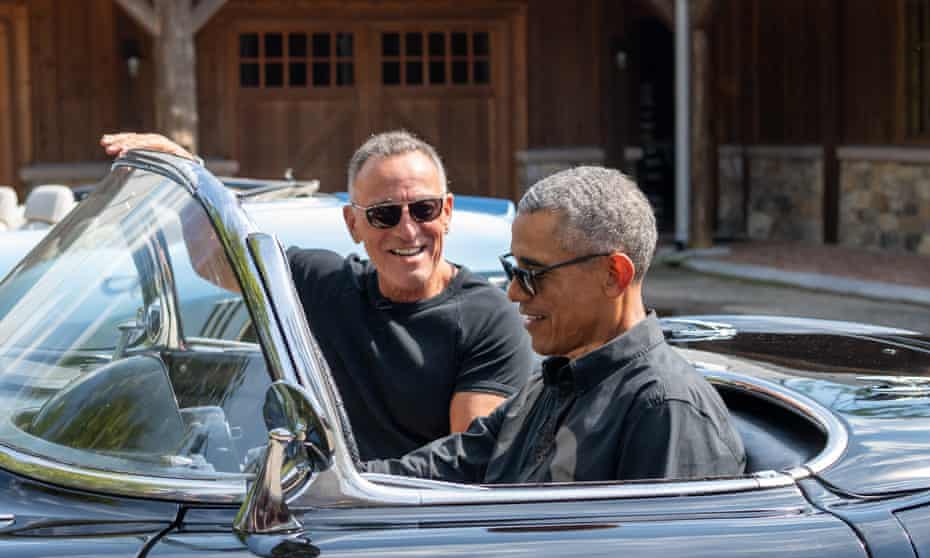
Barack Obama and Bruce Springsteen discuss their dads, their unlikely friendship, and second careers – as podcast hosts
Good conversations don’t follow a script. Like a good song, they’re full of surprises, improvisations, detours. They may be grounded in a specific time and place, reflecting your state of mind and the current state of the world. But the best conversations also have a timeless quality, taking you back into the realm of memory, propelling you forward toward your hopes and dreams. Sharing stories reminds you that you’re not alone – and maybe helps you understand yourself a little bit better.
When Bruce and I first sat down in the summer of 2020 to record Renegades: Born in the USA, we didn’t know how our conversations would turn out. What I did know was that Bruce was a great storyteller, a bard of the American experience – and that we both had a lot on our minds, including some fundamental questions about the troubling turn our country had taken. A historic pandemic showed no signs of abating. Americans everywhere were out of work. Millions had just taken to the streets to protest the murder of George Floyd, and the then occupant of the White House seemed intent not on bringing people together but on tearing down some of the basic values and institutional foundations of our democracy.
Almost a year later, the world looks a shade brighter. But for all the change we’ve experienced as a nation and in our own lives since Bruce and I first sat down together, the underlying conditions that animated our conversation haven’t gone away. And in fact, since the podcast was released, both of us have heard from folks from every state and every walk of life who’ve reached out to say that something in what they heard resonated with them, whether it was the imprint our fathers left on us; the awkwardness, sadness, anger and occasional moments of grace that have arisen as we navigate America’s racial divide; or the joy and redemption that our respective families have given us. People told us that listening to us talk made them think about their own childhoods. Their own dads. Their own home towns.
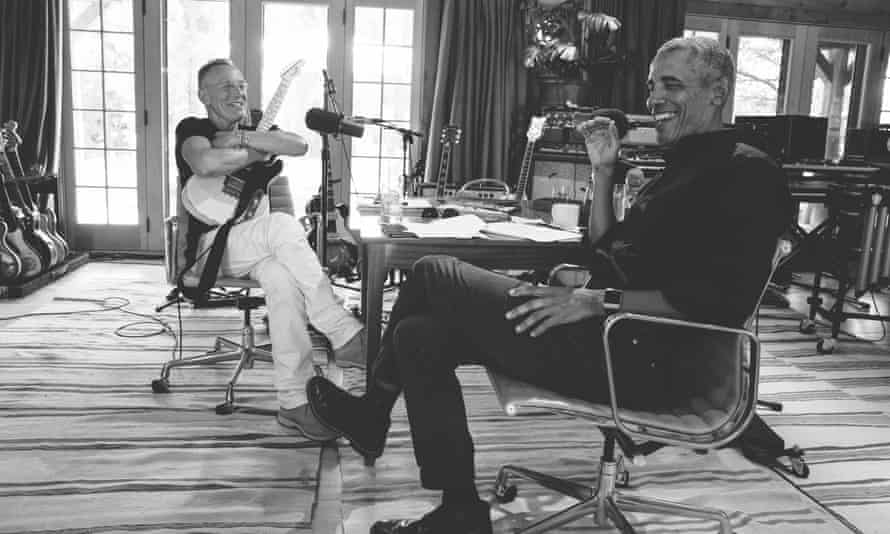
Bruce Springsteen
When
President Obama suggested we do a podcast together, my first thought
was: “OK, I’m a high school graduate from Freehold, New Jersey, who
plays the guitar … What’s wrong with this picture?” My wife Patti said:
“Are you insane?! Do it! People would love to hear your conversations!”
The president and I had spent some time together since we met on the campaign trail in 08. That time included some long, telling conversations. These were the kind of talks where you speak from the heart and walk away with a real understanding of the way your friend thinks and feels. You have a picture of the way he sees himself and his world.
So I took Patti’s advice and followed the president’s generous lead, and before we knew it we were sitting in my New Jersey studio, riffing off each other like good musicians.
There were serious conversations about the fate of the country, the fortunes of its citizens, and the destructive, ugly, corrupt forces at play that would like to take it all down. This is a time of vigilance when who we are is being seriously tested.
We found a lot in common. The president is funny and an easy guy to be around. He’ll go out of his way to make you feel comfortable, as he did for me so that I might have the confidence to sit across the table from him. At the end of the day we recognised our similarities in the moral shape of our lives. It was the presence of a promise, a code we strive to live by. Honesty, fidelity, a forthrightness about who we are and what our goals and ideas are, a dedication to the American idea and an abiding love for the country that made us.
We are both creatures stamped Born in the USA. Guided by our families, our deep friendships and the moral compass inherent in our nation’s history, we press forward, guarding the best of us while retaining a compassionate eye for the struggles of our still young nation.
My father’s house
Springsteen From when I was a young man, I lived with a man who suffered a loss of status and I saw it every single day. It was all tied to lack of work, and I just watched the low self-esteem. That was a part of my daily life living with my father. It taught me one thing: work is essential. That’s why if we can’t get people working in this country, we’re going to have an awful hard time.
Obama It is. It is central to how people define themselves in the sense of self-worth. For all the changes that have happened in America, when it comes to “What does it mean to be a man?”, I still see that same confusion, and the same limited measures of manliness today, as I had back then. And that’s true, whether you’re talking about African American boys or white boys. They don’t have rituals, road maps and initiation rites into a clear sense of a male strength and energy that is positive as opposed to just dominating.
I talk to my daughters’ friends about boys growing up, and so much of popular culture tells them that the only clear, defining thing about being a man, about being masculine, is excelling in sports and sexual conquest …
Springsteen And violence.
Obama And violence. Those are the three things. Violence, if it’s healthy at least, is subsumed into sports. Later, you add to that definition: making money. How much money can you make? And there are some qualities of the traditional American male that are absolutely worthy of praise and worthy of emulating. That sense of responsibility, meaning you’re willing to do hard things and make some sacrifices for your family or for future generations. But there is a bunch of stuff in there that we did not reckon with, which now you’re seeing with #MeToo, with women still seeking equal pay, with what we’re still dealing with in terms of domestic abuse and violence. There was never a full reckoning of who our dads were, what they had in them, how we have to understand that and talk about that. What lessons we should learn from it. All that kind of got buried.
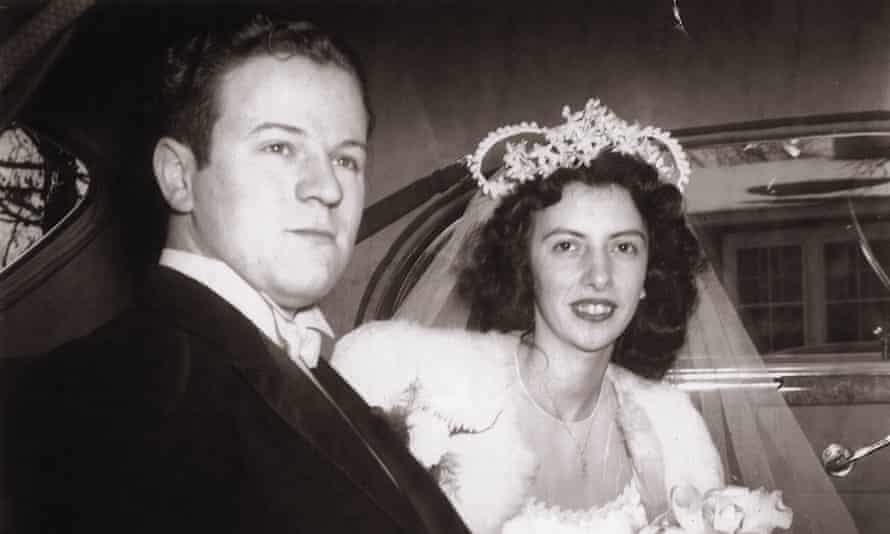
Springsteen Yeah, but we sort of ended up being just 60s versions of our dads, carrying all the same sexism.
Obama You don’t show emotion, you don’t talk too much about how you’re feeling: your fears, your doubts, your disappointments. You project a general “I’ve got this”.
Springsteen Now, I had that tempered by having a father who was pretty seriously mentally ill, and so in high school I began to become very aware of his weaknesses even though, outwardly, he presented as kind of a bullish guy who totally conformed to that standard archetype. Things went pretty wrong in the last years of high school and in the last years that I lived with him at our house. There was something in his illness or in who he was that involved a tremendous denying of his family ties. I always remember him complaining that if he hadn’t had a family he would’ve been able to take a certain job and go on the road. It was a missed opportunity. And he sat there over that six-pack of beers night after night after night after night and that was his answer to it all, you know? So we felt guilt. And that was my entire picture of masculinity until I was way into my 30s, when I began to sort it out myself because I couldn’t establish and hold a relationship; I was embarrassed simply having a woman at my side. I just couldn’t find a life with the information that he’d left me, and I was trying to over and over again.
You think: if I can’t get to him and I can’t have him, I’ll be him. I’m on stage. I’m in workmen’s clothes. I’ve never worked a job in my life
All the early years I was with Patti, if we were in public I was very, very anxious. I could never sort that through, and I realised: “Well, yeah, these are the signals I got when I was very young: that a family doesn’t strengthen you, it weakens you. It takes away your opportunity. It takes away your manhood.” And this is what I carried with me for a long, long time. I lived in fear of that neutering, and so that meant I lived without the love, without the companionship, without a home. And you have your little bag of clothes and you get on that road and you just go from one place to the next.
And you don’t notice it when you’re in your 20s. But, right around 30, something didn’t feel quite right. Did you have to deal with that at all?
Obama So there’s some stuff that’s in common and then there’s stuff that tracks a little differently. So my father leaves when I’m two. And I don’t see him until I’m 10, when he comes to visit for a month in Hawaii.
Springsteen What brought him to visit you eight years after he left?
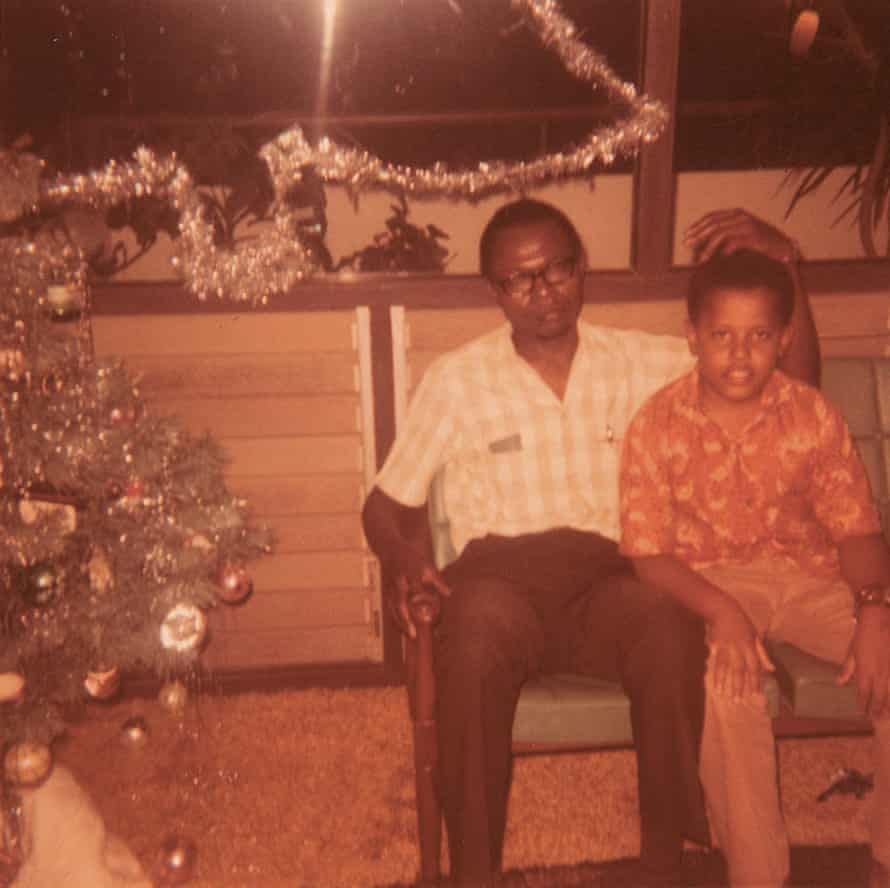
Obama So the story is that my father grows up in a small village in the north-western corner of Kenya. And he goes from herding goats to getting on a jet plane and flying to Hawaii and travelling to Harvard, and suddenly he’s an economist. And in that leap from living in a really rural, agricultural society to suddenly trying to pretend he’s this sophisticated man about town, something was lost. Something slipped. Although he was extraordinarily confident and charismatic and, by all accounts, could sort of run circles around people intellectually, emotionally, he was scarred and damaged in all kinds of ways that I can only retrace from the stories that I heard later, because I didn’t really know him. Anyway, when he’s a student in Hawaii, he meets my mother. I am conceived. I think the marriage comes after the conception.
But then he gets a scholarship to go to Harvard and he decides: “Well, that’s where I need to go.” He’s willing to have my mother and me go with him, but I think there are cost issues involved and they separate. But they stay in touch. He goes back to Kenya, gets a government job, and he has another marriage and another set of kids.
Springsteen When he comes back to visit you, he has another family …
Obama He’s got another family, and I think he and his wife are in a bad spot. And I think he was probably trying to court my mother and to convince her to grab me and move all of us to Kenya, and my mother, who still loved him, was wise enough to realise that was probably a bad idea. But I do see him for a month. And … I don’t know what to make of him. Because he’s very foreign, right? He’s got a British accent and he’s got this booming voice and he takes up a lot of space. And everybody kind of defers to him because he’s just a big personality. And he’s trying to sort of tell me what to do.
He’s like, “Anna” – that’s what he’d call my mother; her name was Ann – “Anna, I think that boy … he’s watching too much television. He should be doing his studies.” So I wasn’t that happy that he had showed up. And I was kind of eager for him to go. Because I had no way to connect to the guy. He’s a stranger who’s suddenly in our house.
In some cases, people whose fathers aren’t there – and whose mothers are really bitter about it – what they absorb is how terrible that guy was
So he leaves. I never see him again. But we write. When I’m in college I decide: “If I’m going to understand myself better, I need to know him better.” So I write to him and I say: “Listen, I’m going to come to Kenya. I’d like to spend some time with you.” He says: “Ah, yes. I think that’s a very wise decision, you come here.” And then I get a phone call, probably about six months before I was planning to go, and he’s been killed in a car accident.
But two things that I discovered, or understood, later. The first was just how much influence that one month that he was there had on me, in ways that I didn’t realise.
He actually gave me my first basketball. So I’m suddenly obsessed with basketball. How’d that happen, right? But I remember that the other thing we did together was, he decided to take me to a Dave Brubeck concert. Now, this is an example of why I didn’t have much use for the guy, because, you know, you’re a 10-year-old American kid and some guy wants to take you to a jazz concert.
Springsteen Take Five, you’re not going to love …
Obama Take Five! So I’m sitting there and … I kind of don’t know what I’m doing there. It’s not until later that I look back and say: “Huh.” I become one of the few kids in my school who’s interested in jazz. And when I got older my mother would look at how I crossed my legs or gestures and she’d say: “It’s kind of spooky.”
The second thing that I learned was, in watching his other male children – who I met and got to know later when I travelled to Kenya – I realised that, in some ways, it was probably good that I had not lived in his home. Because, much in the same way that your dad was struggling with a bunch of stuff, my dad was struggling, too. It created chaos and destruction and anger and hurt and long-standing wounds that I just did not have to deal with.
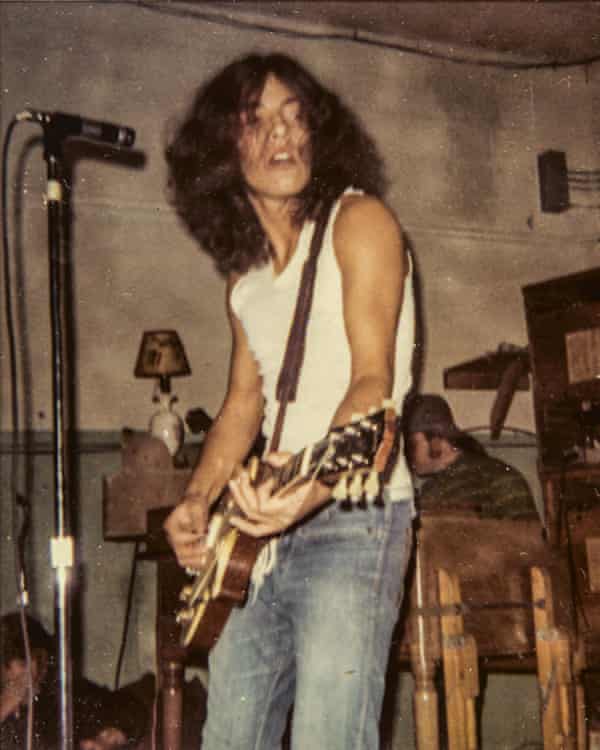
Springsteen The thing that happens is: when we can’t get the love we want from the parent we want it from, how do you create the intimacy you need? I can’t get to him and I can’t have him. I’ll be him. That’s what I’ll do. I’ll be him … I’m way into my 30s before I even have any idea that that’s my method of operation. I’m on stage. I’m in workmen’s clothes. I’ve never worked a job in my life.
My dad was a beefy, bulky guy. I’ve played freaking guitar my whole life, but I’ve got 20 or 30 extra pounds on me from hitting the gym. Where’d that come from? Why do I spend hours lifting up and putting down heavy things for no particular reason? My entire body of work, everything that I’ve cared about, everything that I’ve written about, draws from his life story.
Here is where I was lucky. At 32, I go into hardcore analysis. I don’t have my children until I’m 40, so I’m eight years into looking into a lot of these things, because what I found out about that archetype was it was fucking destructive in my life. It drove away people I cared about. It kept me from knowing my true self. And I realised: “Well, if you wanna follow this road, go ahead. But you’re going to end up on your own, my friend. And if you want to invite some people into your life, you better learn how to do that.”
And there’s only one way you do that: you’ve got to open the doors. And that archetype doesn’t leave a lot of room for those doors to be open because that archetype is a closed man. Your inner self is forever secretive and unknown: stoic, silent, not revealing of your feelings.
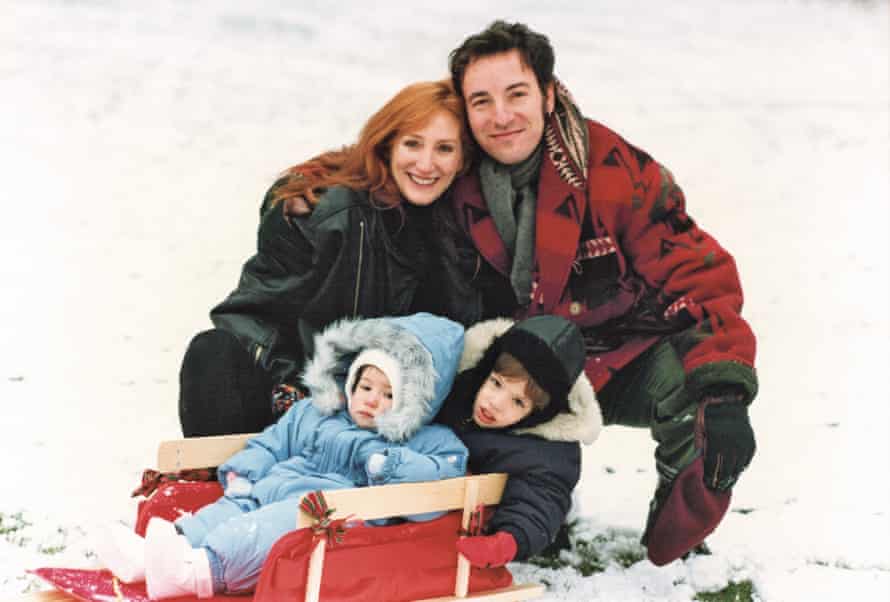
Well, you’ve got to get rid of all of that stuff if you want a partnership. If you want a full family, and to be able to give them the kind of sustenance and nurture and room to grow they need in order to be themselves and find their own full lives, you better be ready to let a lot of that go, my friend.
My dad never really spoke to me through [to] the day he died. He didn’t know how. He truly did not. He just didn’t have the skills at all. And once I understood how ill he was, it makes up for a lot of it. But when you’re a six-year-old or an eight-year-old or a nine-year-old boy, you’re not going to have an understanding of what your father is suffering with, and …
Obama You end up wrestling with ghosts.
Springsteen I guess that’s what we all do.
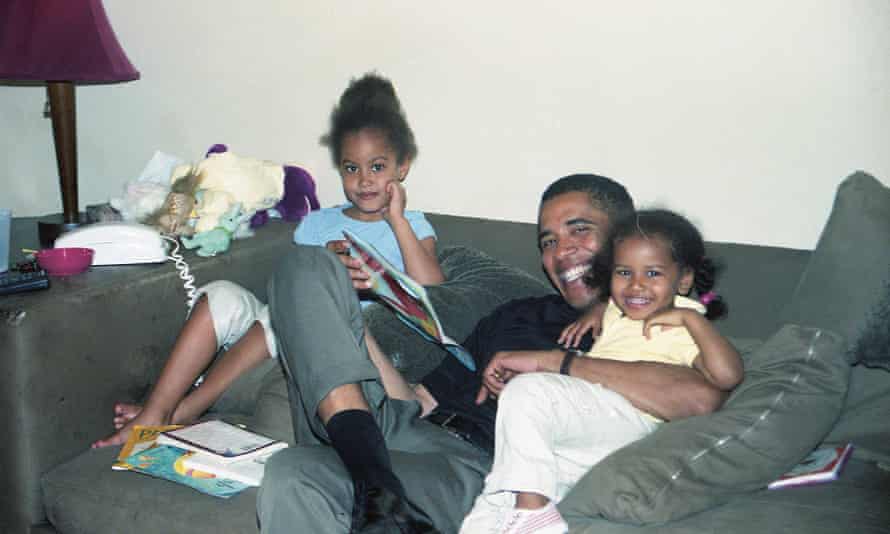
Obama And ghosts are tricky because you are measuring yourself against someone who is not there. And, in some cases, I think people whose fathers aren’t there – and whose mothers are feeling really bitter about their fathers’ not being there – what they absorb is how terrible that guy was and you don’t want to be like that guy.
In my mother’s case, she took a different tack, which was that she only presented his best qualities and not his worst. And in some ways that was beneficial, because I never felt as if I had some flawed inheritance; something in me that would lead me to become an alcoholic or an abusive husband or any of that. Instead, what happened was I kept on thinking: “Man, I got to live up to this.” Every man is trying to live up to his father’s expectations or live up to his mistakes.
You know, Michelle wonders sometimes: “Why is it that you just feel so compelled to just do all this hard stuff ? I mean, what’s this hole in you that just makes you feel so driven?” And I think part of it was kind of early on feeling as if: “Man, I got to live up to this. I got to prove this. Maybe the reason he left is because he didn’t think it was worth staying for me, and no, I will show him that he made a mistake not hanging around, because I was worth investing in.”
Springsteen You’re always trying to prove your worth. You’re on a lifetime journey of trying to prove your worth to …
Obama Somebody that’s not there.
Springsteen The trick is you have to turn your ghosts into ancestors. Ghosts haunt you. Ancestors walk alongside you and provide you with comfort and a vision of life that’s going to be your own. My father walks alongside me as my ancestor now. It took a long time for that to happen.
This is a condensed and edited extract from Renegades: Born in the USA by Barack Obama and Bruce Springsteen. It is published on Tuesday (Viking, £35).
No comments:
Post a Comment